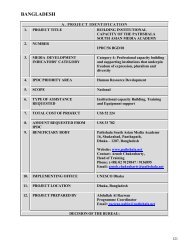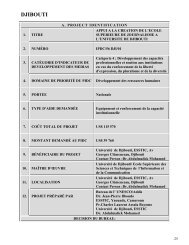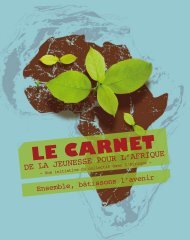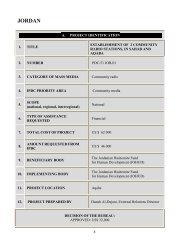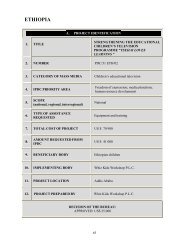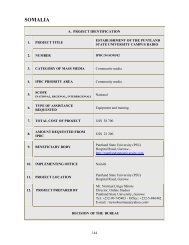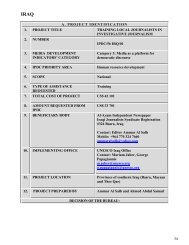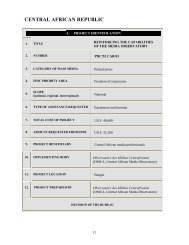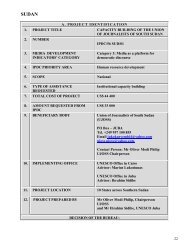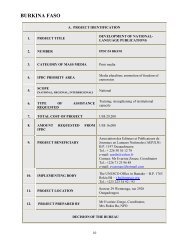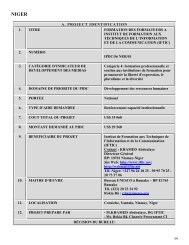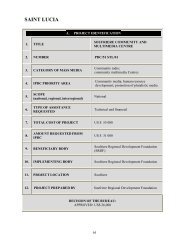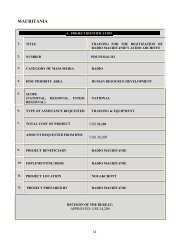PANAMA - Communication and Information
PANAMA - Communication and Information
PANAMA - Communication and Information
Create successful ePaper yourself
Turn your PDF publications into a flip-book with our unique Google optimized e-Paper software.
<strong>PANAMA</strong><br />
1.<br />
2.<br />
A. PROJECT IDENTIFICATION<br />
PROJECT TITLE<br />
COMMUNICATION, KEY ELEMENT<br />
FOR PERSONAL AND SOCIAL<br />
DEVELOPMENT IN INDIGENOUS<br />
COMMUNITIES<br />
NUMBER<br />
IPDC/56 PAN/01<br />
3. MEDIA DEVELOPMENT<br />
INDICATORS’ CATEGORY<br />
4. IPDC PRIORITY AREA<br />
5.<br />
SCOPE<br />
Category 3: Media as a platform for<br />
democratic discourse<br />
Human resource development<br />
National<br />
6. TYPE OF ASSISTANCE<br />
REQUESTED<br />
Financial<br />
7. TOTAL COST OF PROJECT US$ 35 000<br />
8.<br />
9.<br />
10.<br />
11.<br />
AMOUNT REQUESTED FROM<br />
IPDC<br />
BENEFICIARY BODY<br />
IMPLEMENTING OFFICE<br />
US$ 25 000<br />
Fundación para la Educación en la<br />
Televisión (FETV)<br />
www.fetv.org<br />
Vía Ricardo J. Alfaro<br />
detrás del Edificio de PostGrado de la<br />
USMA<br />
Apdo. 6-7295<br />
El Dorado Panamá<br />
Panamá<br />
UNESCO San José<br />
PROJECT LOCATION Panama (Ngöbe Bugle region)<br />
12. PROJECT PREPARED BY<br />
DECISION OF THE BUREAU:<br />
Mrs Teresa Wong<br />
Phone: +507 230-8000/230-8014<br />
Fax: + 507 230-1955<br />
E-mail: tereli@fetv.org<br />
114
1. PROJECT JUSTIFICATION:<br />
B. PRESENTATION<br />
As a society it is essential to recognize <strong>and</strong> contribute towards the respect of indigenous peoples’ human rights.<br />
The universal values of freedom, equality, solidarity, tolerance, respect for nature, respect for others, <strong>and</strong><br />
respect for cultures <strong>and</strong> languages, are essential in the safeguarding of respectful relations between human<br />
beings, communities <strong>and</strong> societies, <strong>and</strong> in order to address this issue it is important to first look at the sociocultural<br />
diversity of a country.<br />
Native groups with whom FETV has worked previously, <strong>and</strong> with whom it is intended to extend the coverage of<br />
this project, consist of the communities belonging to the provinces of Chiriqui <strong>and</strong> Veraguas, (referred to as<br />
Nedrin <strong>and</strong> Kodrian), of the Ngöbe Bugle region. Such communities have distinct beliefs, values, practices,<br />
communications, behaviours, worldview <strong>and</strong> institutions (family, economic, political, <strong>and</strong> religious institutions)<br />
which are characteristic <strong>and</strong> serve to preserve their culture as a bastion of the Panamanian society. These<br />
indigenous groups have historically been excluded from the socio-economic development of the rest of the country due to ethnic,<br />
geographical <strong>and</strong> socio-economic reasons. Cultural barriers currently exist due to a lack of underst<strong>and</strong>ing of these<br />
cultural contexts which in many cases give presedence to certain cultures over others, determining their<br />
positioning in Panamanian society.<br />
This population group encounters problems with the public services, since cultural differences in terms of<br />
language <strong>and</strong> communication, values, beliefs, <strong>and</strong> lifestyles are not taken into account, therefore creating<br />
organizational barriers. Further social barriers exist due to the level of education of indigenous peoples, which is<br />
characterized by high illiteracy rates, particularly among women, <strong>and</strong> economic divides have resulted due to<br />
low income levels, <strong>and</strong> the cost of access to healthcare (including transportation costs, food, lodging, medicines,<br />
<strong>and</strong> loss of working days). Several communities also use barter as a form of payment, which is not accepted in<br />
the non-indigenous society.<br />
This project will focus on alternative methods of communication, to enable participants to develop<br />
communication within their respective communities, in order to improve their professional capacity <strong>and</strong><br />
contribute to initiating improvement <strong>and</strong> development. With this initiative, the Fundación para la Educación en<br />
la Televisión (FETV) will provide support to indigenous groups in order to reinforce access to information,<br />
plurality, diversity of media <strong>and</strong> capacity building, <strong>and</strong> getting the balance right in terms of gender equality in<br />
journalism.<br />
One of the key goals of this project is the transformation of members of rural communities into a source of<br />
effective information, with real participation. By building links with many mass media outlets, effective<br />
communication channels can be created by which these communities will be able to voice their concerns <strong>and</strong><br />
speak of their news <strong>and</strong> events to the rest of the country, which at present they seldom have the opportunity to<br />
do.<br />
2. DESCRIPTION OF THE TARGET GROUP:<br />
50 indigenous communicators (women <strong>and</strong> men) of the provinces of Chiriqui <strong>and</strong> Veraguas (referred to as<br />
Nedrin <strong>and</strong> Kodrian) of the Ngöbe Bugle region.<br />
3. DEVELOPMENT OBJECTIVE:<br />
Enhancement of the indigenous communities´ capacities for defending their culture <strong>and</strong> human rights via<br />
participatory dialogue.<br />
115
4. IMMEDIATE OBJECTIVE:<br />
Indigenous peoples trained to use media to communicate effectively, <strong>and</strong> transmit information about their<br />
perceived needs, their human rights, culture, experiences, events <strong>and</strong> environmental concerns, among other<br />
subjects.<br />
5. PROJECT OUTPUTS:<br />
• 50 indigenous communicators trained in communication techniques<br />
• A national meeting, during which journalists will share experiences <strong>and</strong> learn ways to achieve synergies<br />
with mass communication media<br />
• A television programme, which will allow the 100 journalists already trained in this project, to broadcast<br />
their messages nationwide<br />
• Special messages created by the participants to be broadcast or published, regarding the importance of<br />
effective communication<br />
• Increased awareness by national media such as print newspaper, radio <strong>and</strong> television regarding the<br />
importance of incorporating the less developed (marginal) sectors of society, <strong>and</strong> to have them take part<br />
in the country’s development<br />
• Development of educational support materials for the training of grassroots communicators, taking into<br />
account the specific needs <strong>and</strong> cultural models of the Ngobe Bugle region<br />
• Promotion of the bonding of participants as active communicators within their communities<br />
6. ACTIVITIES:<br />
• Selection of the participating communities<br />
• Visit to these communities to present the programme<br />
• Sensitizing by means of radio <strong>and</strong> television regarding the importance of the proposed programme to<br />
train in communication techniques<br />
• Conduct 4 workshop seminars to train leaders from different communities in the Ngobe Bugle<br />
Reservation for them to become multipliers in their communities through:<br />
- Techniques on reporting news, preparation of articles, letters, banners, <strong>and</strong> promotional<br />
messages <strong>and</strong> advertising, among others<br />
- Techniques of voice management <strong>and</strong> effective organization of the message to be broadcast or<br />
published, <strong>and</strong> presentation of successful communication experiences.<br />
- Underst<strong>and</strong>ing how the work is conducted in television stations, radio stations <strong>and</strong> newspaper,<br />
among other media outlets.<br />
- Learning about the opportunities afforded by regular broadcast media <strong>and</strong> the ways in which we<br />
can take advantage of these opportunities.<br />
• A national meeting at the end of the programme whereby participants will exchange experiences<br />
• Evaluation of workshop sessions<br />
• A television programme regarding the importance of the communication process (which will showcase<br />
the experience of the programme)<br />
• Tours to different mass media companies (radio, television, newspaper) to learn how these companies<br />
operate <strong>and</strong> provide information within Panama<br />
• Seeking donation of equipment to allow participants to practice the concepts learned in the workshops<br />
• Exchange of Experiences Meetings, where participants can share successes <strong>and</strong> experiences gained<br />
during the training programme development, in order to strengthen the communication skills of the<br />
marginalized communities.<br />
•<br />
116
7. PROJECT INPUTS:<br />
• 1 Project coordinator<br />
• 2 Trainers<br />
• Meal allowance<br />
• Transportation<br />
• Accommodation<br />
• Didactic materials <strong>and</strong> supplies<br />
• Educational materials<br />
• Rental of premises<br />
8. WORK PLAN:<br />
ACTIVITIES / MONTH<br />
Selection of communities<br />
1 2 3 4 5 6 7 8 9 10 11 12<br />
Visit selected communities & meet with leaders<br />
Selection <strong>and</strong> contacting of participants<br />
Preparation of training material for journalists<br />
Workshop for journalists<br />
Transmission of knowledge acquired by<br />
participants within the communities<br />
Visit communities for monitoring <strong>and</strong> follow-up<br />
TV programme practice by participants<br />
Experience exchange meeting<br />
Project evaluation <strong>and</strong> final report delivery<br />
9. INSTITUTIONAL FRAMEWORK:<br />
FETV (La Fundación para la Educación en la Televisión), Channel 5, began in 1990 with the application for the<br />
required frequencies under which they broadcast their signal. In 1991 FETV obtained approval of these<br />
frequencies, as well as being appointed a non-profit education institution by the Ministry of Education. Its<br />
mission is to educate <strong>and</strong> increase cultural awareness of the Panamanian society, by providing wholesome<br />
entertainment <strong>and</strong> contributing to critical thinking through information, orientation <strong>and</strong> continuous dialogue,<br />
through producing programming content of a high quality. For over 15 years, as the foundation for education in<br />
television, FETV has been committed to building alternative communication spaces, promoting the sharing of<br />
ideas <strong>and</strong> dialogue through interaction <strong>and</strong> active participation, in an effort to help viewers acquire <strong>and</strong> seek<br />
knowledge to enable them to transform society.<br />
10. SUSTAINABILITY:<br />
FETV will establish an alliance with Consejo Nacional de Periodismo de Panamá (CNP) in order to continue<br />
with the process of providing training to popular journalists to practice <strong>and</strong> apply the learned concepts. FETV<br />
will also promote local activities in the communities for the support <strong>and</strong> development of communication in<br />
marginalized areas.<br />
117
11. FRAMEWORK OF MONITORING:<br />
FETV will evaluate the degree of participation of the invited communicators to the events. This will provide an<br />
underst<strong>and</strong>ing of participants’ concerns, <strong>and</strong> will inform whether or not the stated goals of the training<br />
programme have been fulfilled.<br />
12. EVALUATIONS CARRIED OUT:<br />
FETV has participated in a process of investigation <strong>and</strong> implementation of communication for development<br />
projects, <strong>and</strong> as part of a USAID project, implemented a training programme on rural communication<br />
technologies for the production of Educative content on Audiovisual <strong>Communication</strong> in rural communities of<br />
Panama.<br />
13. FRAMEWORK OF BENEFICIARY AGENCY’S REPORTING:<br />
FETV assumes the responsibility of delivering a report to the UNESCO Office in San José every four months<br />
during the first eight months <strong>and</strong> a final report at the end of the implementation year of the project.<br />
C. ADDITIONAL INFORMATION<br />
On many occasions FETV has collaborated <strong>and</strong> cooperated with other international agencies, namely:<br />
• Canada Fund. Training Programme "Youth Participatory Action." (2008)<br />
• USAID, Cemento Panama, Manzanillo International Terminal, Melo Enterprises, Cable & Wireless, Zona<br />
Libre de Colón. Training Program "Youth <strong>and</strong> Civic Participation." (2007)<br />
• Canada Fund, Cemento Panama, Manzanillo International Terminal, Melo Enterprises, Cable & Wireless,<br />
Colon Free Zone<br />
• Training Program "Youth <strong>and</strong> Civic Participation." (2006)<br />
• Justice <strong>and</strong> Peace Commission. Multi Annual Program for Democracy <strong>and</strong> Human Rights. “Youth in<br />
Action” (2005)<br />
• AECI (Spanish International Cooperation Agency). Production of 110 episodes called "Living in the Field."<br />
• Frederick Ebert Foundation. Training for producers <strong>and</strong> cameramen.<br />
D. BUDGET<br />
BREAKDOWN OF IPDC CONTRIBUTION<br />
(in US dollars)<br />
Trainer fees (2 per workshop at $350 dollars per workshop $58 per day to each trainer) 2 800<br />
4 workshops (Cost of each 3-day workshop for 50 persons is $1800, incl.<br />
accommodation, food allowance, transportation, supplies, participants’ materials) 7 200<br />
A National Encounter: Exchanging Experiences (2-day event for 50 persons, $65 per<br />
day, including food allowance, transportation, lodging, etc.) 6 500<br />
Printing of didactic material for training (preparation, editing, printing of 1500 copies) 1 500<br />
Final report: Camera crew to record images of each workshop, to be used to prepare a<br />
documentary on the whole project, which will be broadcast. (Involves rental of<br />
equipment <strong>and</strong> transportation expenses). 2 000<br />
118
Compilation of material developed in workshops, preparation of final document,<br />
printing of 50 copies, distribution costs. 2 500<br />
Rental of premises <strong>and</strong> unforeseen expenses (communications, couriers, etc.) 2 500<br />
Total US$ 25 000<br />
BREAKDOWN OF THE BENEFICIARY AGENCY’S CONTRIBUTION<br />
(in US dollars)<br />
Two training experts for 6 workshops (food, hotel, transportation, travel expenses) 2 500<br />
Project coordinator 4 000<br />
Project assistant 1 500<br />
Final Report (TV programme): Rental of equipment <strong>and</strong> transportation expenses. 2 000<br />
Total US$ 10 000<br />
119



